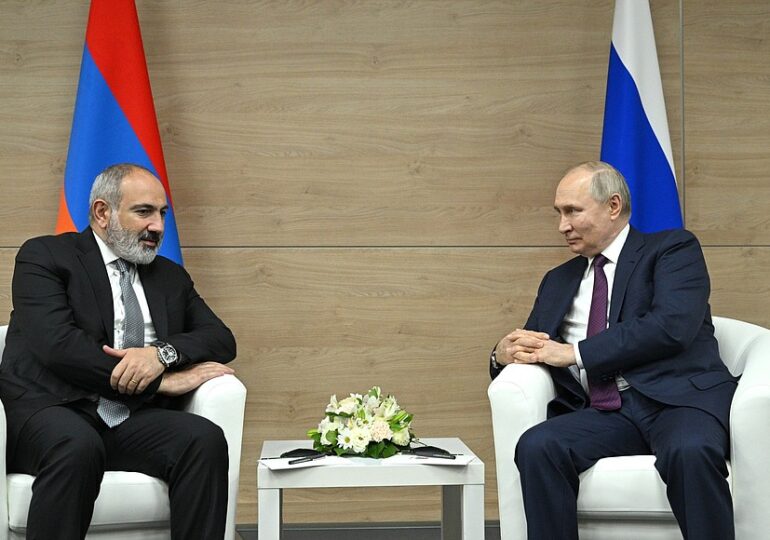The betrayal of a Moscow ally prompted Armenia to abandon its military alliance with Russia and turn towards the West. For Putin, losing support from Yerevan is a serious blow.
Belarus supplied advanced weapons to an enemy of Armenia, even though both Minsk and Yerevan were supposed allies in an international defense pact led by Russia, according to secret documents obtained by Politico.
The information sheds new light on Armenia's decision this week to exit the military alliance, a dramatic turn that will weaken Russian President Vladimir Putin's authority over former Soviet nations.
Armenia is now on the brink of a historic shift towards the West, increasingly looking towards Europe and NATO for protection after decades in which the former Soviet republic relied on Moscow, the publication notes.
Why Did Yerevan Get Upset with Moscow
Armenia has been deeply involved in a fierce conflict with Azerbaijan in the South Caucasus region, at the strategic crossroads between Asia and Europe, a conflict that often escalates into a large-scale war.
Belarus's decision, a reliable ally of Russia, to supply advanced military equipment to Azerbaijan between 2018 and 2022 is seen as a bitter betrayal by Armenia.
Both Belarus and Armenia are members of the Collective Security Treaty Organization (CSTO), a post-Soviet military alliance established in 2002 and led by Moscow. Theoretically, similar to NATO principles, members are obligated to defend each other if attacked. Azerbaijan left a previous form of this bloc in 1999.
Armenian Prime Minister Nikol Pashinyan announced on Wednesday that his government will begin the process of withdrawing from the CSTO, stating that its members "do not fulfill their contractual obligations but plan a war against us with Azerbaijan."
Over a dozen letters, diplomatic notes, sales receipts, and export passports consulted by Politico show that Belarus actively aided Azerbaijan's armed forces between 2018 and 2022, when tensions with Armenia reached a peak. The services provided included upgrading old artillery systems and supplying new equipment used for electronic warfare systems and countering drones.
Officials from Belarus and Azerbaijan did not respond to the publication's request for comment on the information.
Among the mentioned documents are addresses from the Belarusian state arms export agency to its own arms production firms regarding orders for state-of-the-art artillery equipment for Azerbaijan, as well as correspondence between the two states approving the purchase of mobile drone warfare stations for Azerbaijan's armed forces.
Artillery and drones have been heavily used in recent years in the battles between Armenian and Azerbaijani forces.
The same happened in the 2020 war between the two parties over the separatist region of Nagorno-Karabakh, located within Azerbaijan's internationally recognized borders but governed as an unrecognized state by its Armenian population following a brutal conflict that followed the Soviet Union's collapse.
An Azerbaijani offensive in September last year ended the de facto independence of the region and triggered a mass exodus of nearly 100,000 residents.
One of the diplomatic communications obtained by Politico indicates that Belarusian companies played an active role in "restoring the occupied territories of Azerbaijan, as well as in exporting goods and services from Belarus" to this country.
Azerbaijani forces also launched incursions into Armenian territory in September 2022, occupying several key strategic positions. Armenia then requested CSTO support, later accusing the organization of not fulfilling its commitments after it only offered to send a delegation to assess the situation on the ground.
Taking note of CSTO's passivity, Pashinyan, Armenia's leader, concluded an agreement to expand a EU monitoring mission along the tense border between the two former Soviet republics and invited U.S. troops to joint military exercises.
Belarus Doesn't Move on the Front Line without Kremlin's Permission
It became clear to Yerevan that it cannot rely on Vladimir Putin and must seek security guarantees elsewhere. Belarus's betrayal has removed an important ally from the Kremlin's camp and pushed it to seek protection under the Western umbrella, a serious blow to Putin who is about to lose an important state from his sphere of influence.
"This equipment was used devastatingly against Armenian troops and was supplied by a country that was supposed to be an ally of Armenia. Formally, it is a complete violation of the CSTO alliance, but in practice, we have always known that the bloc has favored Azerbaijan more," said Eduard Arakelian, a military analyst at the Regional Center for Democracy and Security in Yerevan, who verified and confirmed that the leaked documents refer to the equipment used by Azerbaijan in recent wars, both in Nagorno-Karabakh and against Armenia.
Although on paper an ally of Armenia, Belarusian President Alexander Lukashenko previously described Azerbaijani President Ilham Aliyev as "our man" and said that it would be wrong for the CSTO to oppose him. "We have more friends in the CSTO than Armenia does," Aliyev himself said in 2022.
For Yerevan, it is not only disturbing that Belarus supported an adversary directly, but also that this could not have happened without the Kremlin's tacit approval. "This truly shows that, with friends like Vladimir Putin, no one needs enemies," said Ivana Stradner, a researcher at the Foundation for Defense of Democracies.
"It is ridiculous to believe that these transfers could have taken place without Moscow's knowledge and that Russia could not have stopped them if it wanted. There is no loyalty when it comes to Moscow – all that matters is maintaining its own security, even at the expense of its allies," she added.
Belarus summoned the Armenian ambassador for a meeting at the Ministry of Foreign Affairs on Thursday, a day after Pashinyan's accusations. The diplomatic representative was subsequently recalled to Yerevan, and the Belarusian ambassador returned to Minsk, marking the diplomatic relations' rupture between the two nations.
T.D.

